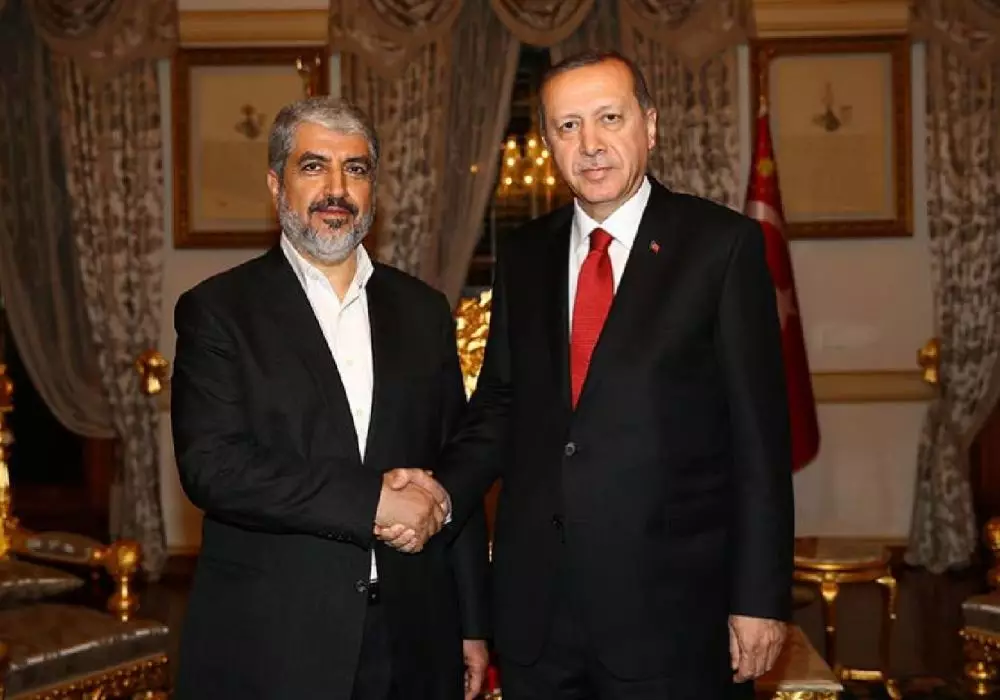Brilio.net - Ismail Haniyeh, a senior Hamas leader, was killed in an airstrike launched by the Israeli military in Gaza on Tuesday (30/7). This attack targeted a building suspected of being a Hamas operations center.
As reported by brilio.net from Al Jazeera's report, Thursday (1/8), the missile fired destroyed the building, killing Haniyeh and several other Hamas members. This attack came after an increase in tensions triggered by rocket attacks from Gaza into Israeli territory previously.
Ismail Haniyeh has long been a central figure within Hamas. He has served as head of Hamas' political bureau since 2017 and was Prime Minister of the Palestinian Authority from 2006 to 2014. Haniyeh is known as a charismatic leader and has an important role in Hamas' political and military strategy. During his leadership, Hamas strengthened relations with Iran and Qatar, which were their main supporters in facing Israel.

photo: X/@anwaribrahim
International reaction to Haniyeh's death was mixed. Israel claimed that the attack was a defensive measure to protect its citizens from the threat of Hamas militants, as reported by The Times of Israel. However, a number of countries and international organizations, including the UN, have voiced concern over the escalation of violence and called on all parties to exercise restraint. The Guardian reported that many fear Haniyeh's death could trigger a new wave of violence in the region.
This incident occurred amidst increasingly deteriorating conditions in Gaza, where Israel's blockade and Egypt's border closure have worsened the humanitarian situation. According to a report from Human Rights Watch, economic and social conditions in Gaza are increasingly depressed, and Haniyeh's death is seen as a factor that could worsen or even change the dynamics of the existing conflict.
Haniyeh's death has also sparked speculation about who will be his successor, especially in the midst of ongoing Gaza ceasefire negotiations.
Khaled Mashal profile.

photo: X/@anwaribrahim
Khaled Mashal is one of the key figures in Hamas and is said to be a strong candidate to replace Ismail Haniyeh. Born in 1956 in Silwad, near Ramallah, Mashal moved to Kuwait with his family as a young man. According to Middle East Monitor, he studied engineering at Kuwait University and became involved in political activities during his college years. In 1987, Mashal joined Hamas and soon became one of its most influential members.
As head of Hamas' political bureau from 1996 to 2017, Khaled Mashal played an important role in building international relations for Hamas. The New York Times reported that Mashal was known as an accomplished diplomat who had managed to gain support from various countries, including Iran, Qatar and Turkey. Despite supporting armed resistance against Israel, Mashal has also been involved in indirect negotiations with Israel.
Under his leadership, Hamas underwent several strategic changes, including the publication of a new policy document in 2017 that indicated a slight shift towards a more pragmatic political approach. This document, according to The Washington Post, recognizes pre-1967 Palestinian borders as a basis for negotiations, although it still rejects formal recognition of Israel. Mashal also encouraged a non-violent approach to resistance in some situations, although Hamas' military wing remained active.
Hamas sources say Mashal is expected to be chosen as the group's top leader to replace Ismail Haniyeh. Apart from Mashal, two senior Hamas officials in Doha, namely Mousa Abu Marzouk and Khalil al-Hayya, are also said to be in the market for candidates to replace Haniyeh.
Potential impact of Ismail Haniyeh's death.Ismail Haniyeh's death is expected to have a major impact on Hamas and political dynamics in the Middle East. Internally, this leadership vacuum could trigger a power struggle between factions within Hamas. According to a Brookings Institution analysis, Khaled Masal, with his experience and reputation, is likely to lead this transition, despite facing significant challenges from internal factions.
Regionally, Haniyeh's death could worsen relations between Israel and Palestine, especially if retaliation from Hamas occurs. Reuters reported that Israel would likely face additional rocket attacks from Gaza, which could trigger a further military response. This situation has the potential to spread to neighboring countries, considering the sensitivity of the Palestinian issue in the Arab and Islamic world.

photo: X/@YavuzSelim23_1
In an international context, Haniyeh's death raises questions about the future of the Middle East peace process. Countries that support Palestine may increase pressure on Israel to exercise restraint, while Western countries may renew mediation efforts to prevent further conflict. According to Foreign Policy, Khaled Mashal's leadership will largely determine Hamas' new direction, whether it will continue to take a confrontational approach or open itself to more substantive peace negotiations.
These events also underscore the ongoing complexity and instability in the Middle East. With the death of Ismail Haniyeh, the world is closely watching how Hamas and the international community will navigate this challenge, hoping to find a way out of the decades-long conflict.
(brl/wen)